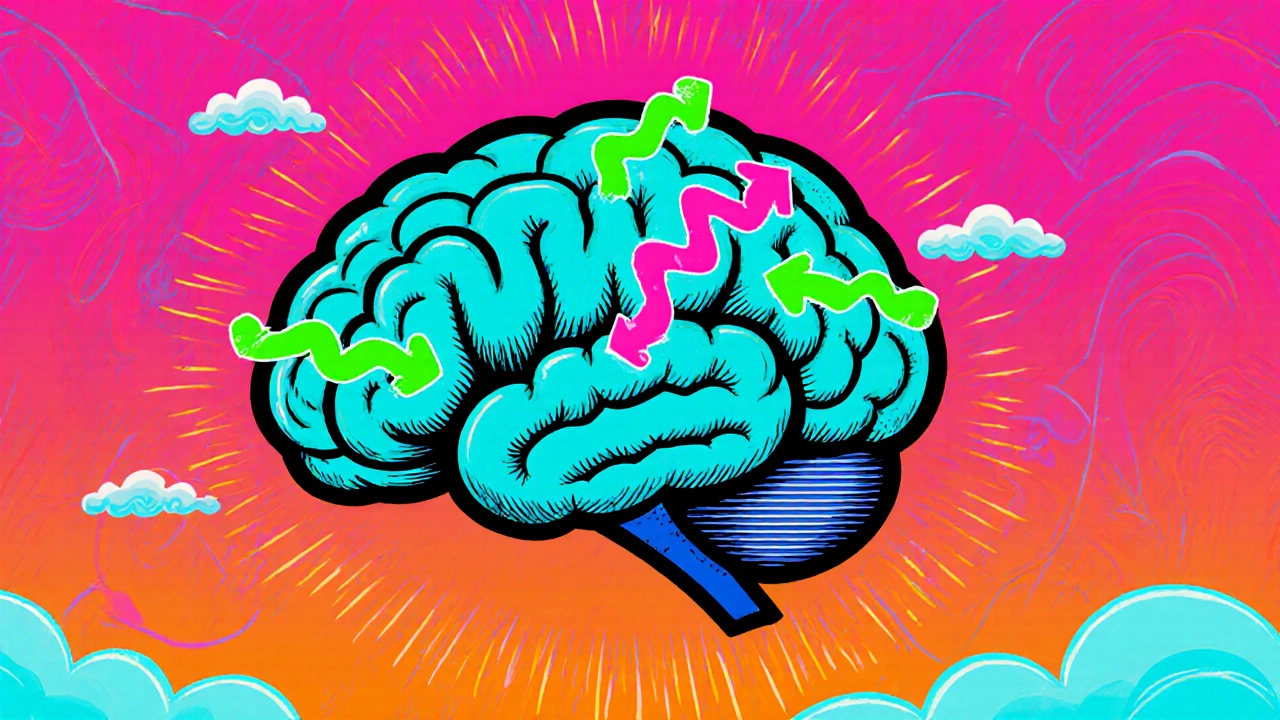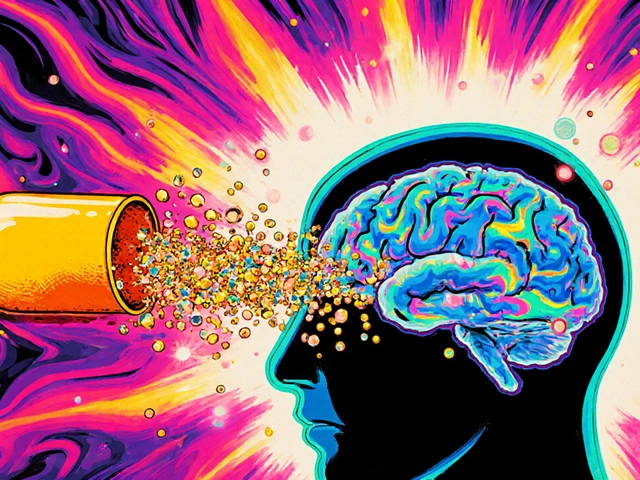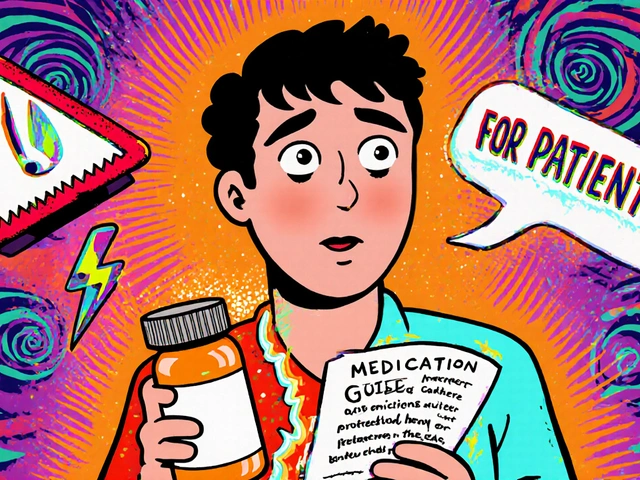Imagine walking into a room feeling sure of yourself, no dread about performance, and a calm mind that lets you enjoy the moment. For many men, that confidence hinges on managing premature ejaculation, a condition that silently chips away at self‑esteem. Dapoxetine is a short‑acting selective serotonin reuptake inhibitor (SSRI) approved for treating premature ejaculation in men. By tackling the physical triggers, it also eases the mental load, helping you feel steadier and more confident.
What is Dapoxetine?
Dapoxetine is a prescription medication designed to prolong the time to ejaculation. It belongs to the selective serotonin reuptake inhibitor (SSRI) family, but unlike typical antidepressant SSRIs, it works quickly and is taken only on demand, about 1‑3 hours before sexual activity.
The drug received FDA approval in 2009 for on‑demand use, and it’s marketed under brand names such as Priligy in many countries. Its rapid onset (about 30‑60 minutes) and short half‑life (about 1-2 hours) mean it clears the system fast, minimizing lingering side effects.
How Dapoxetine Works in the Brain
To grasp why Dapoxetine helps confidence, you need a quick peek at the brain chemistry. Serotonin is a neurotransmitter that modulates mood, anxiety, and sexual function. By inhibiting its reuptake, Dapoxetine keeps more serotonin available in the synaptic gap, which slows down the ejaculatory reflex.
In simple terms, higher serotonin levels give the nervous system a longer “brake” period before the climax signal fires. That extra time reduces the frantic rush many men feel, which in turn eases performance‑related anxiety.
The Mental Health Connection: Anxiety, Depression, and Premature Ejaculation
Premature ejaculation (PE) isn’t just a physical hiccup; it’s tightly linked to mental health. Studies show that men with PE are up to three times more likely to report anxiety and twice as likely to experience depressive symptoms. The cycle often looks like this:
- Early climax → fear of disappointing partner.
- Fear fuels anxiety → tighter pelvic muscles.
- Tight muscles trigger even quicker ejaculation.
Breaking the loop requires both physical and psychological tools. Dapoxetine attacks the first link by extending ejaculation latency, which instantly reduces the fear factor. When the body isn’t rushing, the mind can relax, lowering anxiety and improving overall mood.

Clinical Evidence: Dapoxetine Improves Mood and Confidence
Several randomized controlled trials (RCTs) published between 2010 and 2023 have measured not only ejaculatory latency but also quality‑of‑life scores. One 2021 multi‑center study of 1,264 participants found:
- Mean increase in intravaginal ejaculatory latency time (IELT) from 0.9 min to 3.2 min.
- Significant reduction in the State‑Trait Anxiety Inventory (STAI) scores - an average drop of 7 points.
- Improved International Index of Erectile Function‑5 (IIEF‑5) confidence sub‑scale by 15%.
Another 2022 open‑label study focused on men who reported low self‑esteem. After 8 weeks of using Dapoxetine on demand, participants rated their confidence on a 1‑10 scale, climbing from an average of 3.8 to 7.2.
These numbers tell a clear story: By giving the body more control, Dapoxetine lets the brain stop spiraling into worry, which translates into a tangible confidence boost.
Practical Considerations: Dosage, Timing, and Side Effects
Here’s the typical regimen most clinicians recommend:
- Start low: 30 mg taken 1-3 hours before intercourse.
- If tolerated but not effective, increase to 60 mg after at least one week.
- Maximum recommended dose is 120 mg, but many men find 60 mg sufficient.
Common side effects (usually mild) include nausea, headache, dizziness, and occasional insomnia. Because Dapoxetine is short‑acting, these symptoms usually fade within a few hours. Side effects are less likely if you avoid alcohol and heavy meals close to the dose.
Important contraindications:
- Use of other SSRIs or monoamine oxidase inhibitors (MAOIs) - risk of serotonin syndrome.
- Severe heart disease or uncontrolled hypertension.
- Depression that requires daily antidepressant therapy; in such cases a regular SSRI might be more appropriate.
Always discuss your full medication list with a healthcare provider before starting Dapoxetine.
Using Dapoxetine to Build Real‑World Confidence
Medication alone won’t perform miracles, but pairing it with a few mindset tricks can skyrocket results:
- Set realistic expectations. Knowing that the drug takes about 30‑60 minutes to work lets you plan ahead and avoid panic.
- Practice mindful breathing. Slow, diaphragmatic breaths during foreplay keep the parasympathetic nervous system active, extending the relaxed window.
- Communicate openly. Sharing your plan with your partner reduces performance pressure for both of you.
- Track progress. Keep a simple log of dosage, timing, and how you felt. Seeing the numbers improve reinforces confidence.
These habits turn the pharmacological benefit into a lasting psychological shift-your brain learns that longer sessions are normal and not threatening.

Alternative Options: How Dapoxetine Stacks Up
If you’re weighing your choices, here’s a quick side‑by‑side look at the most common PE treatments.
| Treatment | Mechanism | On‑Demand Use | Typical Side Effects | Best For |
|---|---|---|---|---|
| Dapoxetine | Short‑acting SSRI (increases serotonin) | Yes (30‑60 min before) | Nausea, headache, dizziness | Men needing flexible timing & confidence boost |
| Clomipramine | Tricyclic antidepressant (serotonin & norepinephrine) | No (daily dose) | Dry mouth, constipation, drowsiness | Those who prefer a daily regimen |
| Behavioral Therapy (Stop‑Start, Squeeze) | Physical conditioning of ejaculatory reflex | No (requires practice) | Frustration, time‑consumption | Couples seeking non‑pharmacologic approach |
| Topical Anesthetics (e.g., lidocaine spray) | Reduces penile sensitivity | Yes (applied 10‑15 min before) | Numbness, reduced pleasure | Men with high sensitivity, no mood concerns |
Notice how Dapoxetine stands out for its dual impact: it directly lengthens IELT while also calming the anxiety loop. If confidence is your primary goal, the on‑demand nature and quick clearance make it a top pick.
When to Seek Professional Help
Even the best medication can’t replace a solid doctor‑patient relationship. Consider seeing a specialist if you notice:
- Persistent mood swings or depressive episodes that don’t improve.
- Severe side effects lasting more than 24 hours.
- Little to no change in ejaculatory latency after 4 weeks at the maximum dose.
- Relationship strain despite using medication.
Therapists who specialize in sexual health can blend cognitive‑behavioral strategies with pharmacology, delivering a holistic confidence upgrade.
Key Takeaways
- Dapoxetine is a short‑acting SSRI that treats premature ejaculation by boosting serotonin.
- By extending the time to climax, it disrupts the anxiety‑ejaculation feedback loop, often lifting confidence and mood.
- Clinical trials report both longer IELT and measurable drops in anxiety scores.
- Side effects are generally mild and short‑lived; avoid alcohol and other serotonergic drugs.
- Combine the pill with breathing exercises, communication, and progress tracking for lasting mental‑health benefits.
Can Dapoxetine be used daily?
No. Dapoxetine is designed for on‑demand use only. Taking it daily can increase the risk of side effects and may lead to tolerance.
Will Dapoxetine help with general anxiety?
It’s not a primary anxiety medication, but many users report lower performance‑related anxiety because the drug lengthens ejaculation and reduces the fear of early climax.
Is there an age limit for taking Dapoxetine?
Regulatory agencies typically approve it for men 18 years and older. For younger patients, safety data are limited.
Can I combine Dapoxetine with alcohol?
It’s best to avoid alcohol around the dose. Alcohol can amplify dizziness and nausea, and it may also heighten anxiety, counteracting the benefit.
How long does Dapoxetine stay in my system?
The drug’s half‑life is about 1-2 hours, so it’s usually cleared within 24 hours. This short duration reduces the chance of lingering side effects.








October 26, 2025 AT 18:33
Jennie Smith
Thanks for breaking it down so clearly-reading about the serotonin boost really helped me picture what’s going on in the brain. I’ve tried a few breathing drills before, but pairing them with a short‑acting SSRI sounds like a game‑changer. Keeping a simple log of dosage, timing, and mood can turn those numbers into real confidence. It’s also great to remember that the pill isn’t a magic wand; the mindset tricks seal the deal.
Looking forward to hearing more personal experiences!
November 8, 2025 AT 12:06
Greg Galivan
Just take the pill and stop over‑thinking it.
November 21, 2025 AT 05:40
Anurag Ranjan
Dapoxetine’s half‑life of 1‑2 hours means it clears quickly, so you can avoid lingering side effects and still get the latency boost you need.
December 3, 2025 AT 23:13
James Doyle
From a pharmacological ethics standpoint, the on‑demand usage of short‑acting selective serotonin reuptake inhibitors such as dapoxetine raises profound considerations about autonomy versus medicalization of sexual performance. First, the neurochemical modulation of serotonergic pathways constitutes a legitimate therapeutic intervention when calibrated to the pathophysiology of premature ejaculation, thereby aligning with evidence‑based practice standards. Second, the rapid onset and brief elimination half‑life mitigate the risk of chronic serotonergic exposure, which is a salient point for clinicians concerned with iatrogenic tolerance. Third, the integration of behavioral adjuncts-mindful respiration, cognitive reframing, and partner communication-operates synergistically with pharmacotherapy, reinforcing neuroplastic adaptation rather than mere symptomatic suppression. Fourth, the psychometric improvements observed in the State‑Trait Anxiety Inventory substantiates the notion that mitigating performance anxiety yields downstream benefits for overall mental health. Fifth, one must acknowledge the potential for off‑label misuse, particularly when individuals extrapolate the anxiolytic properties of dapoxetine to non‑sexual anxiety disorders without proper psychiatric oversight. Sixth, regulatory frameworks in several jurisdictions underscore the necessity of prescriber vigilance, especially concerning contraindications such as concomitant monoamine oxidase inhibitors. Seventh, the cost‑benefit analysis should incorporate both the direct economic outlay for the medication and the indirect gains in relational satisfaction and occupational productivity. Eighth, the patient‑reported increase in confidence scores from 3.8 to 7.2 illustrates a quantifiable shift in self‑efficacy, which aligns with the biopsychosocial model of health. Ninth, clinicians are urged to employ shared decision‑making models, presenting dapoxetine as one component of a multimodal strategy rather than a monolithic solution. Tenth, the adverse event profile-predominantly nausea, headache, and transient dizziness-remains manageable with proper dosing titration and lifestyle modifications such as avoiding alcohol. Eleventh, longitudinal data beyond the eight‑week window remain sparse, warranting cautious optimism pending further real‑world evidence. Twelfth, the sociocultural stigma attached to premature ejaculation can be attenuated through public health education that normalizes seeking medical assistance. Thirteenth, from a systems perspective, the integration of sexual health metrics into primary care assessments can facilitate early identification and timely intervention. Fourteenth, the ethical imperative to preserve patient dignity mandates that practitioners discuss the psychological ramifications of untreated premature ejaculation openly. Fifteenth, ultimately, dapoxetine exemplifies a targeted, pharmacokinetically optimized agent that, when employed responsibly, can disrupt the vicious feedback loop between anxiety and premature ejaculation.
Thus, the conscientious application of this medication, embedded within a holistic therapeutic regime, represents a prudent avenue for enhancing both sexual function and mental well‑being.
December 16, 2025 AT 16:46
Edward Brown
Look you think a pill can fix everything but what they don’t tell you is who’s really profiting from the sales chains they push into your bedroom. The pharma giants have lobbied hard to make dapoxetine a must‑have product and they mask the long‑term serotonin reshaping that could affect mood beyond the bedroom. Every prescription adds another data point to the big data farms that track your sexual performance for profit. And while they brag about short half‑life they hide the subtle withdrawal spikes that can seed anxiety later. It’s a classic case of commodifying intimacy to keep you buying more. So read the fine print and don’t let the glossy brochures dictate your confidence.
December 29, 2025 AT 10:20
ALBERT HENDERSHOT JR.
When you combine dapoxetine with a structured confidence‑building routine, the results can be truly transformative. Start each session by setting a clear intention, breathe deeply, and remind yourself that the medication is a tool, not a crutch. Track your progress in a journal – note dosage, timing, and how you felt afterward – this reinforces the mental association of success. Over time you’ll notice a natural shift in self‑esteem that extends beyond the bedroom 😊.
January 10, 2026 AT 00:06
Suzanne Carawan
Oh great, because journaling about a pill is exactly the life hack I’ve been missing.
January 22, 2026 AT 17:40
Kala Rani
Dapoxetine may boost latency but it can also leave you feeling queasy and dizzy later it’s not a miracle cure and you still have to manage the mental pressure without relying on a drug.
February 4, 2026 AT 11:13
Octavia Clahar
I totally get how unsettling it feels when performance anxiety takes over, and it’s amazing that dapoxetine can give you that extra window to breathe. Just remember the medication works best when you’re also open with your partner about what you’re trying. A little patience and consistent use often lead to steady confidence gains. Celebrate each small win – they add up faster than you think.
February 17, 2026 AT 04:46
Lionel du Plessis
Yep the data shows incremental confidence boosts correlate with reduced sympathetic arousal during intercourse.